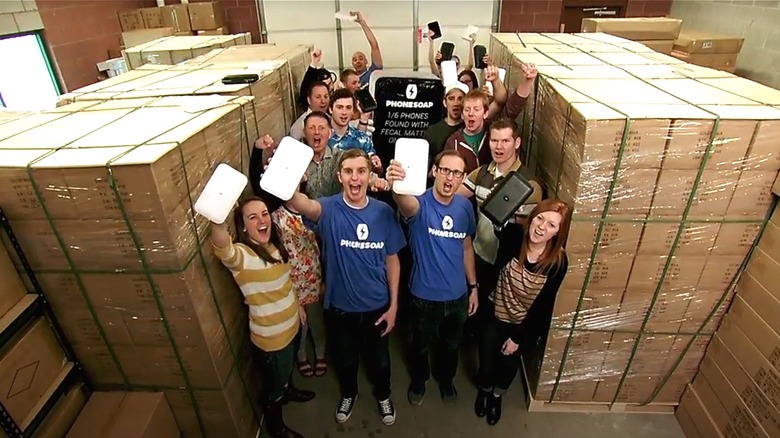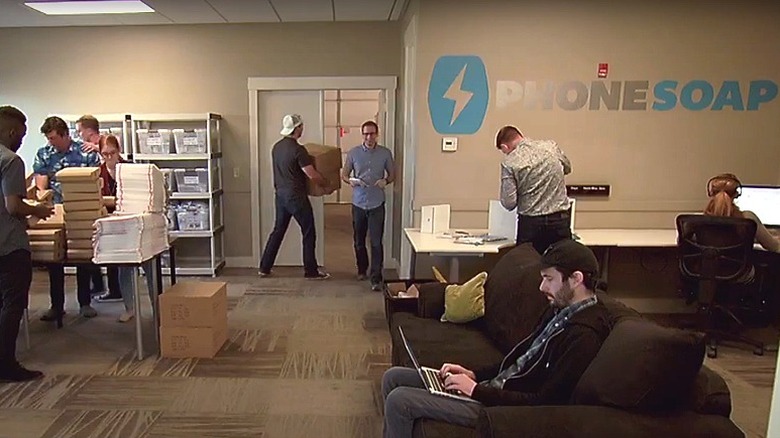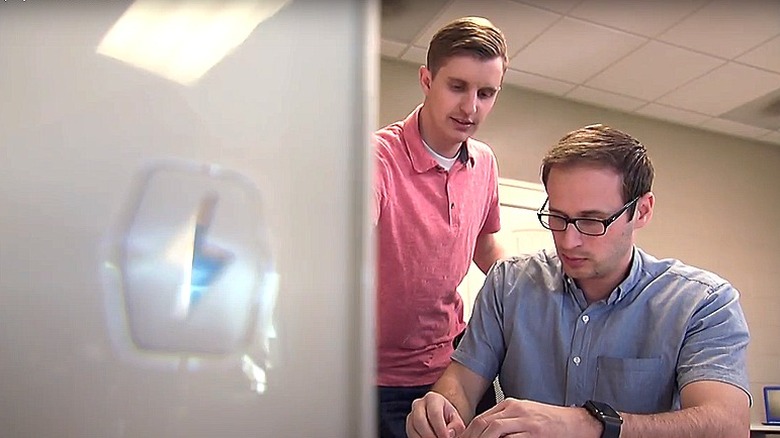Shark Tank's PhoneSoap: Where Is The Company Now?
We may receive a commission on purchases made from links.
Artifice is everywhere in reality TV. It's not just in the sets, the tightly edited formats, and the less-than-impromptu dialogue delivered straight to the camera by contestants. The whole premise of some shows can be more than a little misleading. "Shark Tank" presents itself as a venue for plucky (and sometimes desperate) entrepreneurs to win over a panel of investors, but a deep dive by Forbes found that, in the show's early years, almost three-quarters of deals brokered on the show fell through for a variety of reasons, and roughly half of deals from the middle years met the same fate.
But it doesn't always go that way. The same Forbes article found that investor Lori Greiner was the least likely panelist to close the deals she made on the air, but one that she stuck to was her agreement with Wesley Laporte and Dan Barnes. They had already raised a fair amount of money by the time they came on "Shark Tank" in 2015, but they were still looking for more for their product: PhoneSoap, the UV cleaner for phones and other items.
Greiner wanted to bring PhoneSoap to QVC in exchange for 15% of the company; Laporte and Barnes got her to accept 10% (per Collider). She appeared with the boys on QVC as agreed, and they aimed to see a few hundred thousand units sold. Within a year, they did significantly more than that, and the PhoneSoap business has continued to grow. Here's how things have gone for them since "Shark Tank."
PhoneSoap's business exploded after Shark Tank
By the time they appeared on "Shark Tank," Wesley Laporte and Dan Barnes were already working to move PhoneSoap product. Cousins who grew up together, Laporte and Barnes had long wanted to go into business together. Reports on the amount of bacteria covering cellphones, and the generalized use of UV light as an industrial cleaner, gave them the idea for PhoneSoap.
In a 2016 follow-up interview with ABC (via YouTube) following their appearance on "Shark Tank," Laporte and Barnes said that, prior to coming on the show, they had sold $537,000 worth of product. Lori Greiner's stated goal when she latched onto the company was still within six figures. But the year after PhoneSoap appeared on "Shark Tank," Laporte and Barnes did $4.9 million in sales.
That year saw PhoneSoap's Utah-based company expand to 12 employees. Between the new staff and the amount of product they had to move, Laporte and Barnes had to start looking for additional space. They also moved to expand their product line. They talked up "PhoneSoap 2.0" to ABC, describing it as a universal UV cleaner compared to the original model that was only meant for consumer cellphones. They developed a PhoneSoap for tablets. And they mentioned wanting to diversify by developing commercial and health care products. (Read about Rocketbook, the company "Shark Tank" passed on that went on to find Amazon success.)
PhoneSoap has had success and controversy since Shark Tank
As of November 2024, PhoneSoap is still in business. Besides UV electronic cleaners, the company sells air purifiers, filters for air and water, and various accessories. You can find PhoneSoap products through major retailers such as Amazon. And the company has grown significantly even from its 2016 "Shark Tank" update. (See which super-successful companies rejected their "Shark Tank" offers.)
ZoomInfo reported that PhoneSoap had 90 employees and $24.4 million in revenue as of 2022. Lori Greiner claims on her personal website that PhoneSoap has made $150 million in retail sales since its "Shark Tank" episode. Through its expansions, PhoneSoap's products have generally received positive reviews, and the company has posted tests of its cleaning systems to help confirm their efficacy.
But PhoneSoap hasn't had entirely smooth sailing since Wesley Laporte and Dan Barnes took their pitch to the Sharks. In 2019, an FTC complaint was filed against the company (per PR Newswire), on the grounds of "deceptive product claims." It should be noted that the complaint was filed by CleanSlate UV, a rival company that had previously contacted PhoneSoap about its objections to PhoneSoap's advertising. What, if anything, came of that complaint has not been reported.


